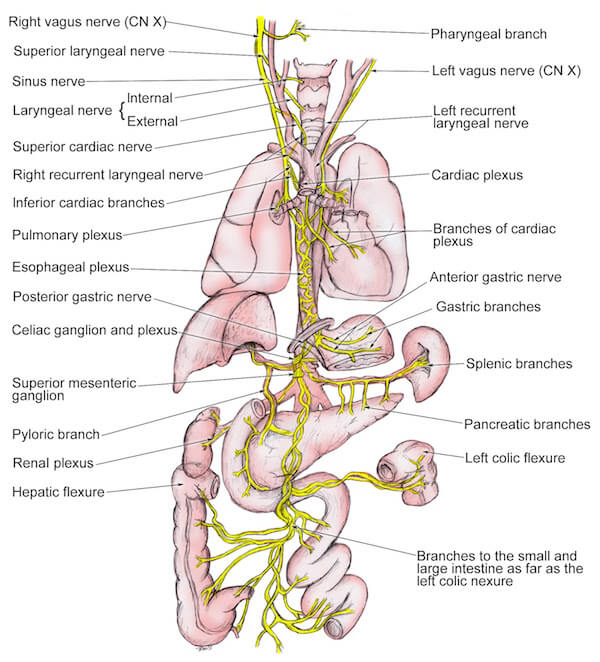EverythingsHazy
Well-Known Member
THE VAGUS NERVE
This thread is for the discussion of the vagus nerve. It connects many parts of our bodies to our brains (image in spoiler below), and it plays an important role in many of our biological functions.

"What does the vagus nerve affect?
The vagus nerve has a number of different functions. The four key functions of the vagus nerve are:
- Sensory: From the throat, heart, lungs, and abdomen.
- Special sensory: Provides taste sensation behind the tongue.
- Motor: Provides movement functions for the muscles in the neck responsible for swallowing and speech.
- Parasympathetic: Responsible for the digestive tract, respiration, and heart rate functioning.
Its functions can be broken down even further into seven categories. One of these is balancing the nervous system.
The nervous system can be divided into two areas: sympathetic and parasympathetic. The sympathetic side increases alertness, energy, blood pressure, heart rate, and breathing rate.
The parasympathetic side, which the vagus nerve is heavily involved in, decreases alertness, blood pressure, and heart rate, and helps with calmness, relaxation, and digestion. As a result, the vagus nerve also helps with defecation, urination, and sexual arousal.
Other vagus nerve effects include:
- Communication between the brain and the gut: The vagus nerve delivers information from the gut to the brain.
- Relaxation with deep breathing: The vagus nerve communicates with the diaphragm. With deep breaths, a person feels more relaxed.
- Decreasing inflammation: The vagus nerve sends an anti-inflammatory signal to other parts of the body.
- Lowering the heart rate and blood pressure: If the vagus nerve is overactive, it can lead to the heart being unable to pump enough blood around the body. In some cases, excessive vagus nerve activity can cause loss of consciousness and organ damage.
- Fear management: The vagus nerve sends information from the gut to the brain, which is linked to dealing with stress, anxiety, and fear - hence the saying, "gut feeling." These signals help a person to recover from stressful and scary situations."
How can we stimulate the vagus nerve, to achieve the benefits listed above?
Here are some ways:
-Deep breathing with slow exhales.
-Humming
-Singing
-Maintaining a healthy gut microbiome. Prebiotics/Probiotics can help with this.
-Taking cold showers and covering your face with cold water can be used to stimulate your natural diving reflex, which nearly instantly lowers our heart rate and anxiety levels.
-Meditation
***I am not a doctor, and am not recommending that you do anything mentioned above.***
***This is just information that I am reading about, and would like to share/discuss with you guys. ***


